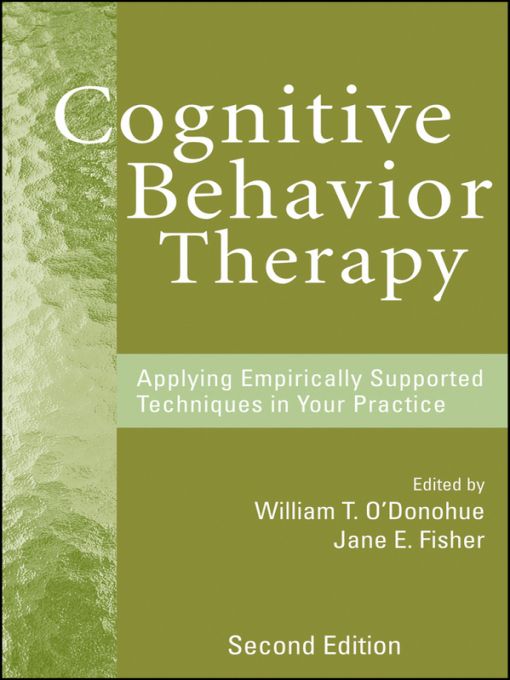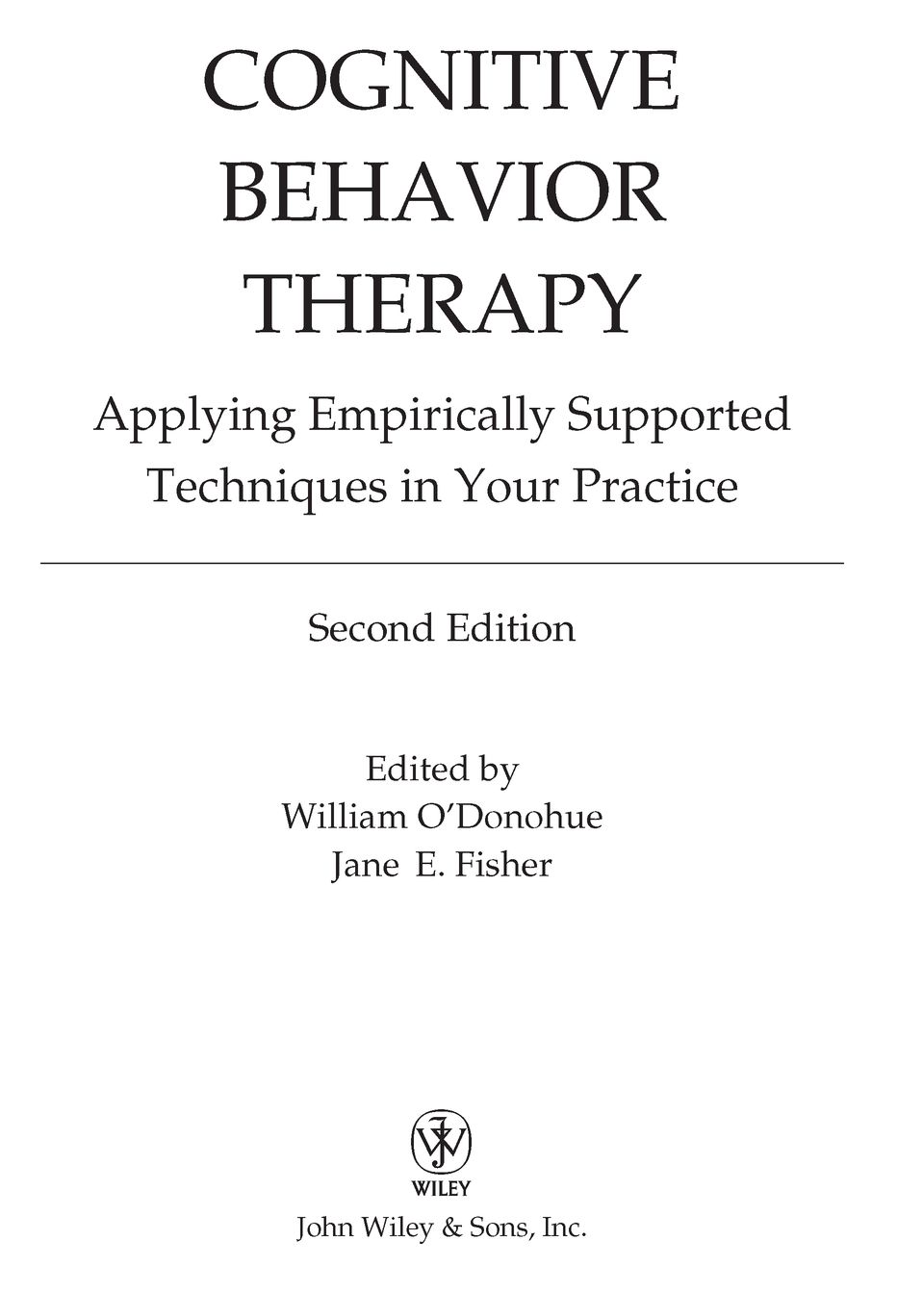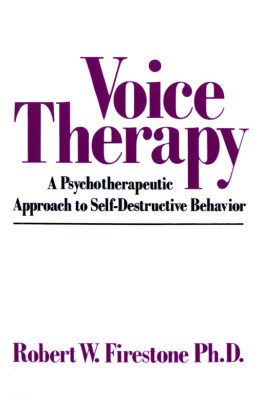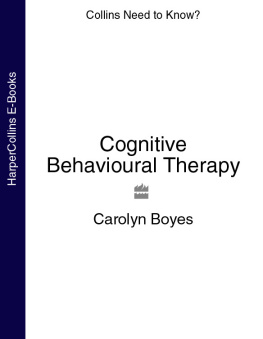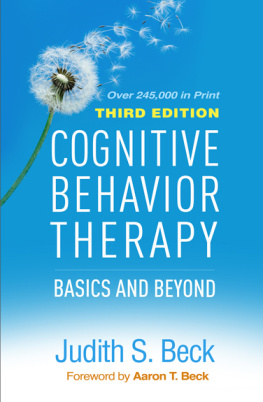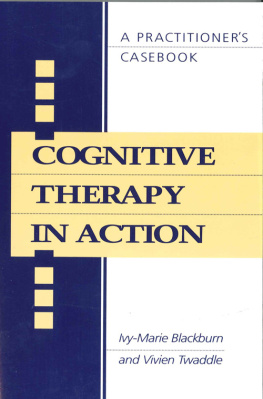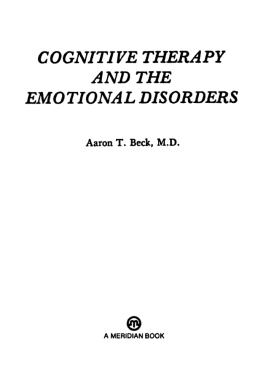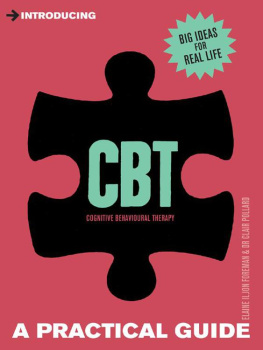Table of Contents
PREFACE
Over the last three decades there has been a significant increase in interest in cognitive behavior therapy. This has occurred for several reasons: 1) Mounting experimental evidence supports the effectiveness of cognitive behavioral therapy for certain psychological problems induding high incidence problems such as depression and the anxiety disorders. The well-known Chambless report, for example, identifies many cognitive behavioral therapies as being empirically supported. In fact, cognitive behavioral techniques comprise most of the list. 2) Cognitive behavior therapy tends to be relatively brief and often can be delivered in groups. Therefore it can be more cost-effective than some alternatives and be seen to offer good value. These qualities have become particularly important in the era of managed care with its emphasis upon cost containment. 3) Cognitive behavior therapy has been applied with varying success to a wide variety of problems (see Fisher and ODonohue, 2006 for over 70 behavioral health problems in which CBT can be considered an evidence based treatment. Thus, it has considerable scope and utility for the practitioner in general practice or the professional involved in the training of therapists. 4) Cognitive behavior therapy is a relatively straight forward and clearly operationalized approach to psychotherapy. This does not mean that case formulation or implementing these techniques is easy. However, CBT is more learnable that techniques such as psychoanalysis or Gestalt therapy. 5) Cognitive behavioral therapy is a therapy system comprised of many individual techniques, with researchers and practitioners constantly adding to this inventory. A given behavior therapist, because of his or her specialty, may know or use only a small subset of these. A clinician or clinical researcher may want to creatively combine individual techniques to treat some intransigent problem or an unfamiliar or complicated clinical presentation.
This volume attempts to bring together all of the specific techniques of cognitive behavior therapy. It does this in an ecumenical fashion. Historically, and currently, there are divisions inside behavior therapy that this book attempts to ignore. For example, cognitive and more traditionally behavioral techniques are included. This offended some prospective authors who were clearly warriors in the cognitive-behavioral battle. We wanted to be inclusive, particularly because pragmatically the outcome research favors both sides of this particular battle.
Our major interest in compiling this book was twofold: First we noted the lack of a volume that provides detailed descriptions of the techniques of cognitive behavioral therapy. Many books mentioned these but few described the techniques in detail. The absence of a comprehensive collection of the methods of cognitive-behavior therapy creates a gap in the training of students and in the faithful practice of cognitive behavior therapy. Second, with the increased interest in cognitive behavior therapy, particularly by the payers in managed care, there has been an increasing bastardization of behavior therapy. Some therapists are claiming they are administering some technique (e.g., relapse prevention or contingency management) when they clearly are not. This phenomenon, in our experience, rarely involves intentional deception but instead reflects an ignorance of the complexities of faith-fully implementing these techniques. This book is aimed at reducing this problem.
There is an important question regarding the extent to which a clinician can faithfully implement these techniques without a deeper understanding of behavior therapy. The evidence is not clear and of course the question is actually more complicated. Perhaps a generically skilled therapist with certain kinds of clients and certain kinds of techniques can implement the techniques well. On the other hand, a less skilled therapist dealing with a complicated clinical presentation utilizing a more subtle technique might not do so well. There is certainly a Gordon Paul type ultimate question lurking here. Something like: What kind of therapist, with what type of problem, using what kind of cognitive behavior therapy technique, with what kind of training, can have what kinds of effects... With the risk of being seen as self-promoting, the reader can learn about the learning and conditioning underpinnings of many of thes techniques in ODonohue (1998); and more of the theories associated with these techniques in ODonohue and Krasner (1995). Fisher and ODonohue (2006) provide a description of particular problems that these techniques can be used with.
References
Fisher, J.E.,& ODonohue, W.T. (2006) Practitioners guide to evidence based psychotherapy. New York: Springer.
ODonohue, W., & Krasner, L. (Eds.). (1995). Theories of behavior therapy. Washington: APA Books.
ODonohue, W. (Ed.). (1998). Learning and behavior therapy. Boston: Allyn & Bacon.
ACKNOWLEDGMENTS
We wish to thank all the chapter authors. They uniformly wrote excellent chapters and completed these quickly.
Wed also like to thank our editor at John Wiley & Sons, Patricia Rossi. She shared our vision for this book, gave us some excellent suggestions for improvement, and has been wonderful to work with.
Wed also like to thank Linda Goddard for all her secretarial skills and expert assistance in all aspects of the manuscript preparation; she was invaluable.
Finally, wed like to thank our families for their support, and especially our children, Katie and Annie, for their enthusiasm and delightfulness.
CONTRIBUTORS
Jonathan S. Abramowitz
University of North Carolina
Chapel Hill, NC
Dean T. Acheson
University at Albany, SUNY
Albany, NY
Jennifer H. Adams
University of Colorado at Denver
Denver, CO
Mark A. Adams, Ph.D., B.C.B.A
Best Consulting, Inc.
Fresno, CA
K. Angeleque Akin-Little
Massey University
Auckland, New Zealand
Mark Alavosius, Ph.D.
University of Nevada, Reno
Reno, NV
Claudia Avina, Ph.D.
University of Nevada, Reno
Reno, NV
Jenna L. Baddeley, M.A.
The University of Texas at Austin
Austin, TX
Anjali Barretto, Ph.D.
Gonzaga University
Spokane, WA
Wendy K. Berg, M.A.
University of Iowa
Iowa City, IA
Jennifer L. Best, Ph.D.
University of North Carolina
Charlotte, NC
Arthur W. Blume, Ph.D.
University of North Carolina
Charlotte, NC
Stephen R. Boggs, Ph.D.
University of Florida
Gainesville, FL
John C. Borrero, Ph.D.
University of Maryland
Baltimore, MD
Carrie S.W. Borrero, Ph.D.
Kennedy-Krieger Institute
Baltimore, MD
Stephanie Both, Ph. D.
Leiden University Medical Center
Leiden, Netherlands
J. Annette Brooks, Ph. D.
New Mexico VA Healthcare System
Albuquerque, NM
Jeffery A. Buchanan
Minnesota State University
Mankato, MN
Eric Burkholder
Dublin Unified School District
Department of Special Education
Dublin, CA
James E. Carr, Ph.D.
Western Michigan University

